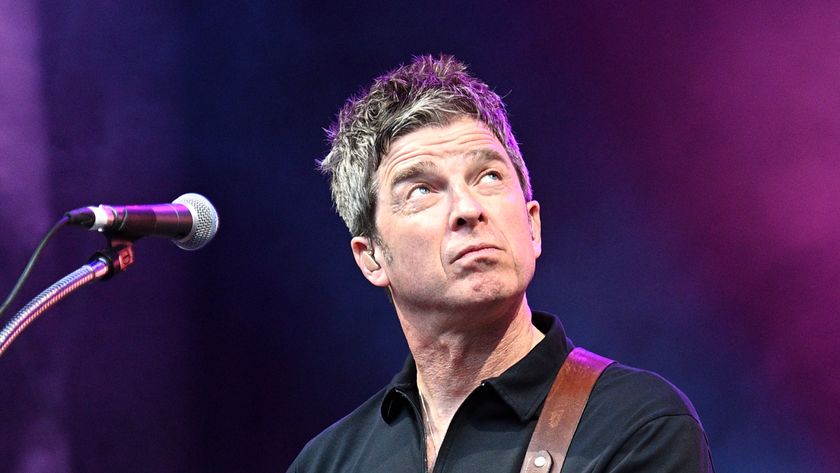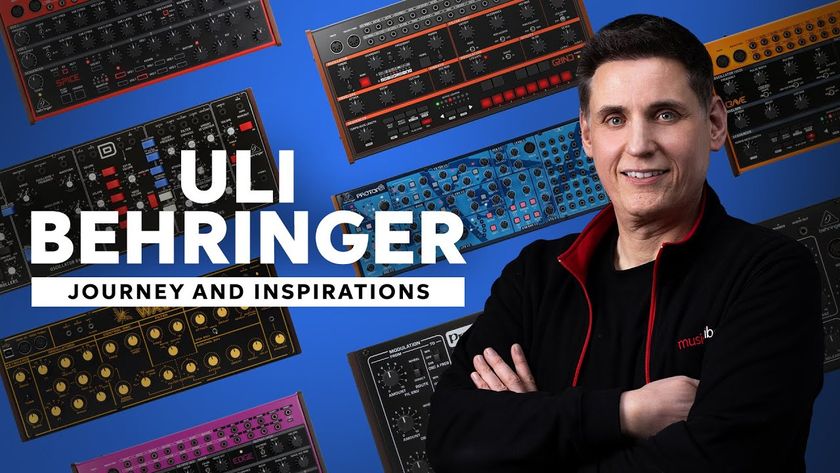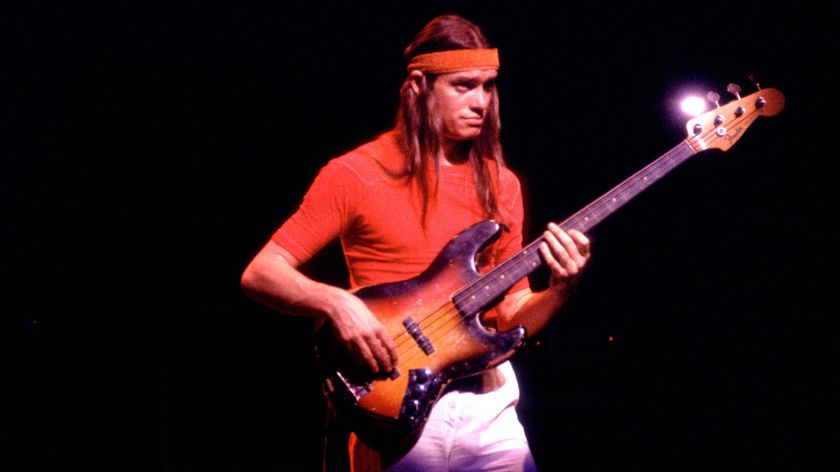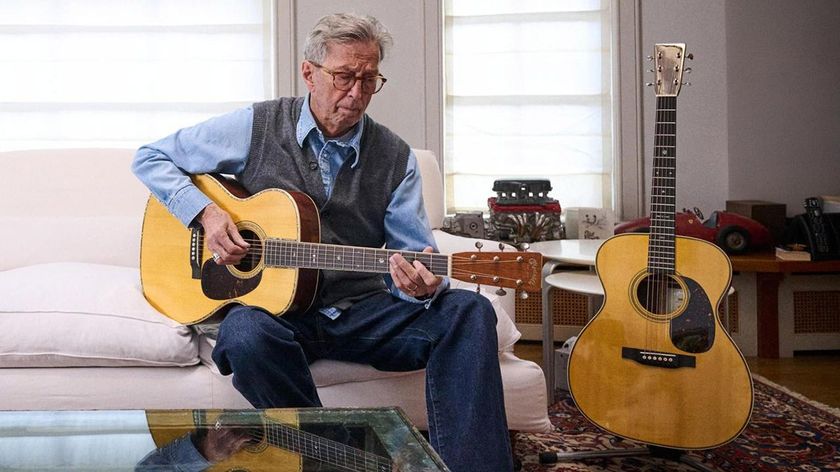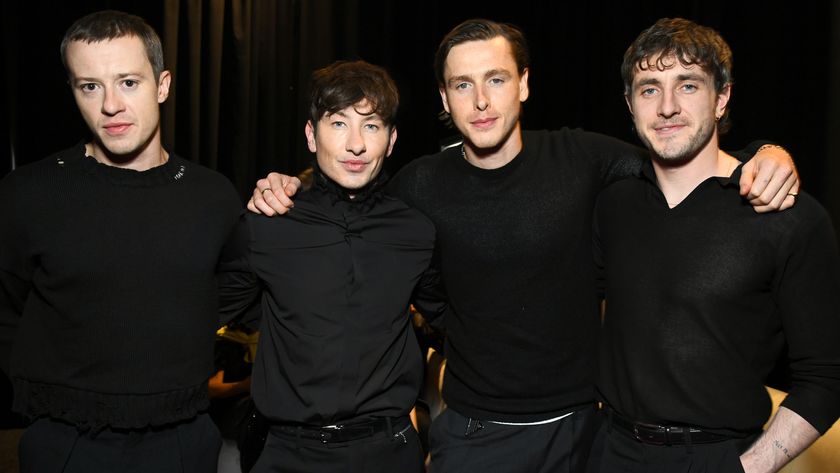Interview: Clark talks Kraftwerk, modulars and production
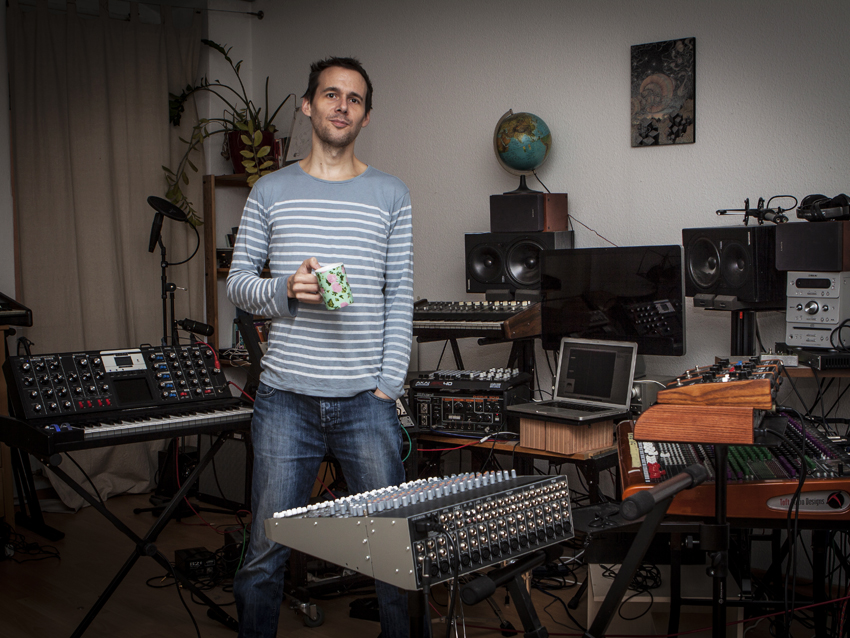
One of the few remaining cutting-edge acts on the Warp Records roster, Clark returns with his new album Iradelphic, a meticulous fusion of manipulated hardware and live instrumentation featuring female vocals courtesy of ex-Tricky protégé Martina Topley-Bird. The electronic producer is set to play at the annual Bloc Festival in London's Pleasure Gardens this July, giving him the chance to air his new modular setup in a frantic live setting.
You live in Berlin now - what's it like living in the capital of the Electronic music scene?
"The thing is, I don't know whether I'm up to date on the Electronic music scene. I mean, there's a Dubstep night here and a lot of Techno, but that's not my favoured choice. Being here 15 years ago would have been a whole different thing. I've played the Berghain a few times - I dropped Slayer there and it destroyed people. Some were really disapproving of it, which is a reaction I tend to hone in on - either pleasing people or disgusting them."
"I see my music as a combination of German timing and English guts."
Can you still smell Kraftwerk's origins in the German air?
"Kraftwerk oscillators and kick drums? I think that lingers everywhere. It's a very structural culture - you can see why Techno appealed to Germans. I see my music as a combination of German timing and English guts. When it comes to timing the Krauts hardly ever get it wrong. One of my favourite drummers is Jaki Liebezeit from Can, just a total, monstrous clockwork machine."
Were you listening to Kraftwerk as a youngster?
"Yeah, but only in the later phase of their career. When I was 13 they played at a rave called Tribal Gathering. They were just this myth really and I remember begging my mum to let me go. I heard the live set on the radio. At the time I was already into Electronic music - I had a drum machine and synths - but the sound they were creating was kind of otherworldly, yet incredibly mechanical and human. They sounded amazing, even on my crappy clock radio."
Everyone was using mostly the same gear, so how did Kraftwerk get that almost patented sound?
"It's a funny one. I know exactly what you mean. I've been going back to Nico, U-Turn, Ed Rush, Optical and all of that early Drum 'n' Bass, and although it sounds quite uniform compared to Kraftwerk's standard, it doesn't sound like it's made on software - like all Dubstep does now, where you can almost hear the presets being used.
"There was a real sense of discovery with that early Drum 'n' Bass which was down to hardware really and just the way they'd crunk distorted basslines out of synths. I kind of miss that; I much prefer making bass through hardware, it's more satisfying - it's not as stable and it's more unpredictable."
What part of your psyche did Electronic music appeal to?
"I think because, at the time, it was so abstract and had that otherworldly seduction to it. You'd see a band and know that when the guy hit the snare drum it would make a certain sound - it'd be an understatement to say that was predictable. But with Electronic music, you never knew how it was being made.
Get the MusicRadar Newsletter
Want all the hottest music and gear news, reviews, deals, features and more, direct to your inbox? Sign up here.
"I remember hearing all these Amen breaks and thinking it was a drum machine that made them. I was going into record shops and they were saying, "No, it's a sample". I said, "What do you mean it's a sample?" I learned about Electronic music just through pestering people because I never really studied it.
You once said that when you listen to music you just hear numbers, could you expand on that?
"Well, my kind of maths is very basic and intuitive. Music to a degree is maths but what's striking is that it's intuitive maths. I've been studying drums and if you write down the equations in polyrhythms they're incredibly simplistic. If you play five over three and then put a pulse on the seven it's quite a basic equation, but when you learn it through your body it's not basic at all and I'd defy anyone who says it is. It's maths, but through your muscle memory and instinct.
"Something can lose its charm through being perfected. That's like the science versus the art side of it."
"Every kid that's born is like a physics machine. We all know this stuff in our bodies and it's maths that allows us to conceptualise it. I never write music with maths in mind; it just flows from the subconscious, I suppose."
Can you listen to your old material objectively?
"No, not at all. My girlfriend's using three tracks of mine, Black Stone, one from Body Riddle and the first from Clarence Park, which all have piano on them. When I hear them together it feels like they're coming from somewhere that hasn't really changed, somewhere quite permanent. In terms of the other evolutions, though, I don't really know, it sounds like a different person a lot of the time."
What's your own approach to making music?
"You start with a preconceived idea but you'd be foolish to doggedly stick to that when other things suggest themselves. It's like an unfolding process and you just have to watch stuff to an extent and try things out. Every track is made differently - I don't really follow any set rules."
What are your favourite bits in the studio?
"My main thing at the moment is this modular setup that I've been building for about a year. In terms of electronic stuff, that's all I want to use, and then I'm much more into recording real instruments, like piano and drums. So it's either modular or recorded.
"I'm trying to get away from computers as much as I can and just use them to sequence on. The way modular throws things up is incredible really, because on one level it's like programming with Max/MSP but you get that something that I've never been able to get with Reaktor or Max, although I've tried - my brain's simply not wired up like that.
I only half-know what I'm doing; I just got one oscillator at first and I was plugging things into the wrong output, making things feed back and doing wave shaping. It gets incredibly messy, but it's instantly rewarding."
But you still use the PC to bring together what you've created with the modular setup?
"Yeah, I mean usually I master a modular track through one stereo output and then just put it through some valves and a few plug-ins of choice - a few limiters. That's kind of it, and then you've got a finished track, which is really appealing because I'm used to spending a lot of time on endless edits.
It's really liberating because you can write four or five tracks in a day - maybe 20 in a week, although only one of them is any good. A lot of the stuff that modular throws up is very processed-focused and you've got to draw the line somewhere because it can often be very dull to listen to; that's when your ears are essential really. I mean, if you play a track to someone they're not really interested in me wave shaping a sawtooth."
But still there's a lot of technique involved - does that interfere with the creative process?
"The main technical challenges I have are with instruments and timing, like playing the drums and recording. That's why I got so engrossed in it last year, because there's a kind of comfort zone with technology that I've been using for 15 years or more. In some ways it's a bit too easy. That's why I like this new side, such as the piano track on the new album - I'm really at the bottom of that and still exploring it. That's when it becomes exciting, when I'm up against my limits. I think that's how you progress - doing stuff that you're not that practised at is how you improve obviously."
Some artists prefer not to read music or take singing lessons for fear of losing their distinctiveness…
"Yeah, I can definitely identify with that. Something can lose its charm through being perfected. That's like the science versus the art side of it. If you were looking for the most perfect scientific music you'd be listening to pure sine tones - in effect, all music is sine tones distorted by what humans do with them. In essence, music is by nature imperfect distortions of sine tones, so yeah, I'm all for embracing the imperfections and the flaws.
Is there any equipment that hasn't been invented that you'd really like to see?
"Well, with Max/MSP you can pretty much do what you want but I've quite often wanted to use drums in a way that's really loose and not quantised. I'd like software that, instead of quantising and syncing stuff, puts it into a chaotic mess. Audio visual could also make a big leap forward with synths where you can paint melodies and stuff. I think we're at a pretty good point really, though - it's almost greedy to ask for more because you can do pretty much anything these days."
Are you constantly on the lookout for new software applications or hardware? "It kind of ebbs and flows. Sometimes I go through periods of frantically sourcing new stuff but at the moment I'm sticking with what I've got. Instead of having endless takes, where you can edit yourself again and again, I'm trying to do it so I've just got the one take. Computers remove that from music, which I'm not entirely down with. I like doing stuff and knowing that that's all I can do and I can't change it."
"Some people have given the album glowing reviews and others are just disgusted that I'd even try using vocals."
You work on dozens of tracks at a time - when do you decide to collate them into an album?
"Quite often the best stuff rises to the top and sticks in your memory - I like to think that that's the case but in truth it doesn't happen like that. With Body Riddle I was looking for one track to complete it and I just couldn't find it. I tend to send stuff to mates and the track Night Knuckles, which I wrote when I was 19, came up and that completed the album. That's quite scary - when you've got so much material you forget about parts of the jigsaw.
Having loads of music is stressful, which is why releasing albums is good because you manage to purge yourself. I tend to keep most stuff but put it on a dusty hard disk and forget about it - I'm a bit of a hoarder."
Your new album Iradelphic appears to have more of a blend of acoustic and electronic elements - was that deliberate?
"That was the concept from the beginning but it took a lot of time to get the textures right so that it felt like a hot fusion rather than detached. That came through using a lot of valves and tape and heavy processing, which gave the album its flavour. The acoustic element started with Body Riddle really, but it was talked up a bit more than the reality of it, in the sense that Iradelphic is a much more acoustic album and has passages that have been totally unedited and not doctored at all, whereas Body Riddle was very heavily processed."
Do you feel the acoustic element brings more emotion to the music?
"I'm not sure. It brings out a different colour of emotion - it softens things a bit and it's a bit less abstract. I'm in no way trying to disregard my origins, though - I'm still massively into electronic stuff. The guitar is played and there's a harpsichord as well, particularly on The Pining Pt II, although some people think it's a guitar, which is weird."
A number of the tracks feature female vocals; was this an attempt to broaden the spectrum of your sound?
"It wasn't a deliberate move to make the album appeal to more people, it's just that I had my own vocals on this track and they weren't really cutting it. I was wondering who could nail it and Martina Topley-Bird came to mind. So I got in touch with her just on the off-chance and she was really up for collaborating on it. It all happened really naturally. She came over and we had a proper studio session - I much prefer doing it like that, I think it's more fruitful. I'm not sure if it's something I'd want to carry on doing but for those two tracks it seemed to work perfectly."
Were you concerned that the vocals would distract the listener from the sound design aspect of your music?
"That's a fair comment. I kind of predicted I was going to get flak from all sides with this album. Some people have given it glowing reviews and others are just disgusted that I'd even try using vocals - I'm destined to divide people. I quite enjoy it to be honest and I'm so used to it - the more albums you release the more people you piss off with whatever direction you choose to take.
"I do agree to a point, though, and I'd like to release instrumentals of those tracks. There's a bit in the middle of the track where Martina's voice drops out and the sound design takes over, and it took a while to get happy with that because when the voice is removed it feels like there's a gap there. It's a real challenge to fill that gap with electronics that are up there with the vocal."
Are you the kind of artist who likes to get feedback on your music?
"Not really - I just give it a cursory glance. It's like if someone's talking to you over the garden fence; it's only human to want to know what they're saying. But I certainly don't let it distract me and it's only ever when I'm releasing music - it's like, here we go again, I've suddenly got all this weird attention. I'm glad when that period of initial promo is over. "Most people are really respectful of my music and if they don't like it then that's fair enough. I'm not looking for ubiquity but I think that you're in a dangerous place if you start writing with a certain audience in mind. It's that classic thing - if you don't like it you don't have to listen to it [laughs]. Personally, I don't watch films that I don't like - I watch films that I do like."
When do you know that it's time to finish or let go of an album?
"I think it's time to let go when you start ruining tracks by doing anything to them, and that was almost happening with Iradelphic - I just had so many mixes. Then finally I had it on over some laptop speakers and my mate was really into it but I didn't want to listen to it anymore, which just made me think, 'That's it, it's done'.
"It's like listening through other people's ears. In its purest form it's a really beautiful feeling and quite often I'll watch films again thinking, 'Would one of my mates like this?' I watch it from their viewpoint, but it's quite weird when it's your music. I don't really like listening to my music in the company of friends - it's like being caught having sex."
Some people say only you can make the music that you want to hear?
"I think that's true. It sounds quite brutal but quite often, when I meet people who want to write music, they want to sound like someone else and they're almost a bit too reverent of other people. It's a really endearing quality to have as a person, but as an artist you have to ultimately be dissatisfied with what you hear - if you're satisfied with just consuming music you're lucky really.
I'm envious of people who can enjoy music without wanting to challenge it or add something different of their own. That's a luxury that you can't have as an artist. I'm not complaining, I love it, but I do feel like I'm filling in a gap and that what I release is in some way unique. Generally, I listen to stuff that's nothing like what I do - from the far reaches of the musical universe."
Looking to the future, how do you intend to develop or who would you like to collaborate with?
"I don't really know, I just want to carry on growing and challenging myself. I can't really see where it's going at the moment - it's a mess, but it's a fertile mess. I don't intend to collaborate in the immediate future, I'm more centred on what I'm doing first and then if anyone of interest comes my way I'll sound them out. I'd like to get Chuck D and Scott Walker in a room together.
I've been in contact with a few directors who I like, but I'd have to see the film. The guy who directed District 9 is a fan of my work and I'm a massive fan of District 9. I'd also love to work with Gaspar Noé, who did the film Enter the Void. If something came my way I'd definitely like to give it a go."
Will you be taking the album out on the road and are you starting to enjoy playing live?
"Yeah, I'm doing loads of gigs around Europe to support the album, which will be fun. I've started enjoying it a lot more since I got this modular setup. There will be new tracks that I'm playing out of Ableton that are being mixed on the fly, but then the modular stuff is purely improvised on the spot. There's oscillators and drum machines and I'm controlling it as it's happening which is really exciting because you don't know what could happen - it could all kind of go quite wrong.
The main thing that can go wrong when you're playing live is the music stopping, so quite often I'll stop a track halfway through to see what that fear feels like. It's weird - people tend to cheer when you stop the music. It's a good way of getting over the fear of silence and its fun to play on the audience's expectations - my live shows are generally pretty raw."
Clark's album Iradelphic is out now and available to download at warp.net


Future Music is the number one magazine for today's producers. Packed with technique and technology we'll help you make great new music. All-access artist interviews, in-depth gear reviews, essential production tutorials and much more. Every marvellous monthly edition features reliable reviews of the latest and greatest hardware and software technology and techniques, unparalleled advice, in-depth interviews, sensational free samples and so much more to improve the experience and outcome of your music-making.

“My love letter to a vanished era that shaped not just my career but my identity”: Mark Ronson’s new memoir lifts the lid on his DJing career in '90s New York
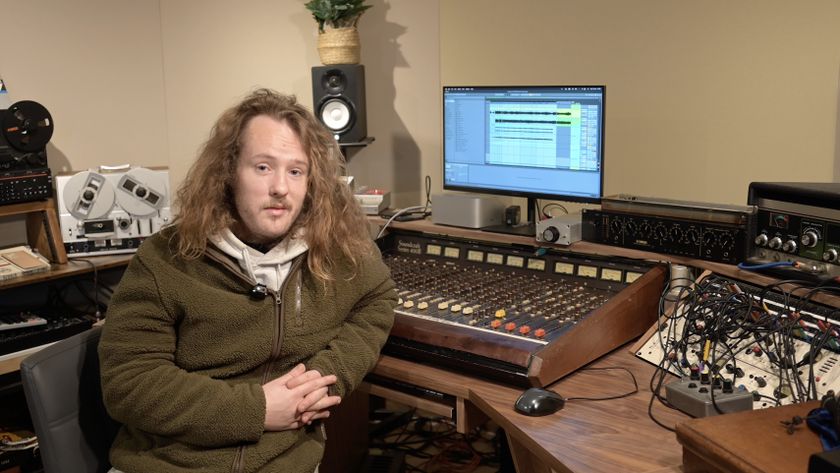
“I’d be running from the studio to other speakers in the house, basically going insane trying to get mixes to sound correct”: Ezra Collective’s Joe Armon-Jones on why he created his Aquarii Studios and his dub-influenced mixing technique



![Chris Hayes [left] wears a purple checked shirt and plays his 1957 Stratocaster in the studio; Michael J. Fox tears it up onstage as Marty McFly in the 1985 blockbuster Back To The Future.](https://cdn.mos.cms.futurecdn.net/nWZUSbFAwA6EqQdruLmXXh-840-80.jpg)
